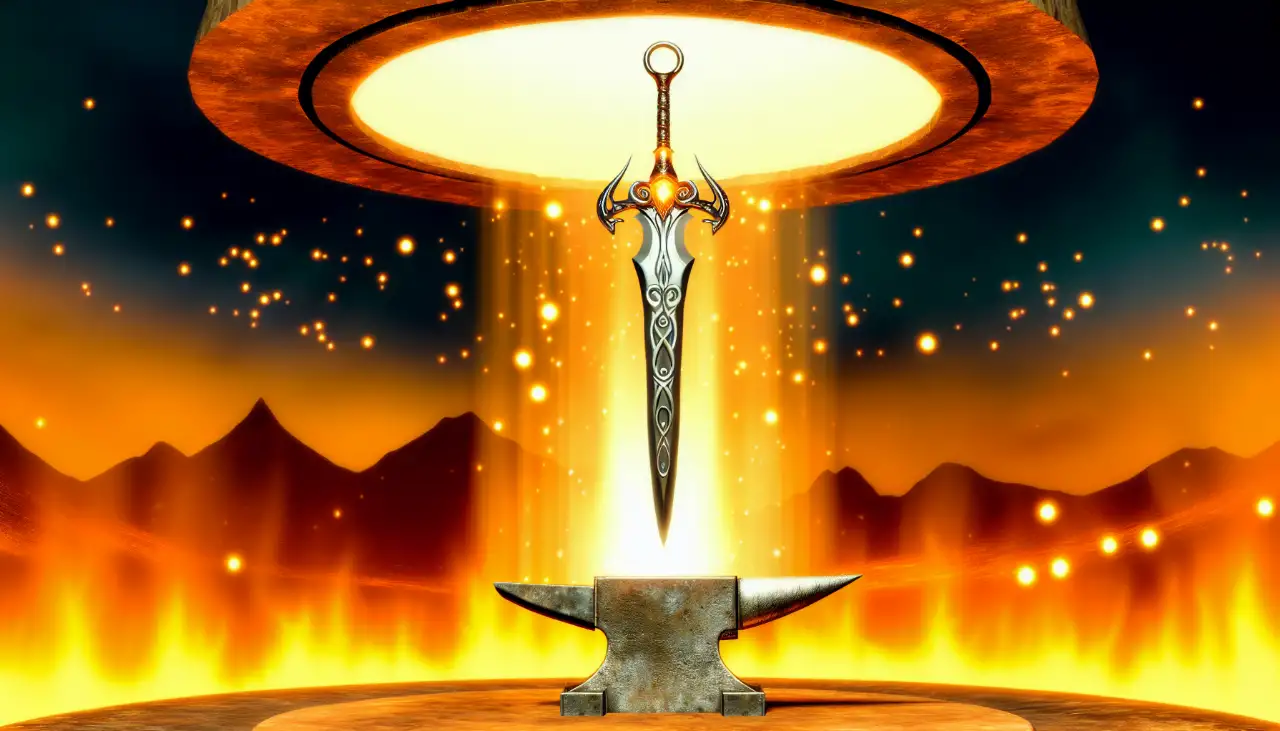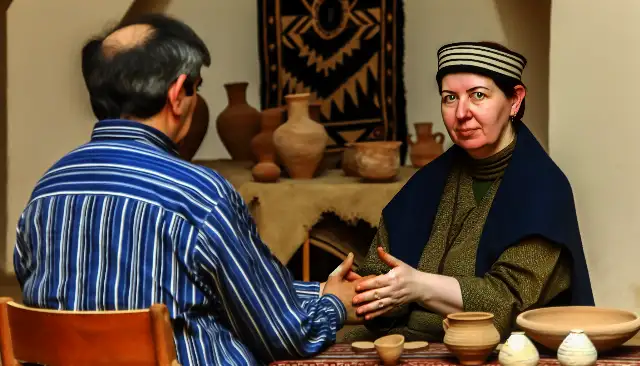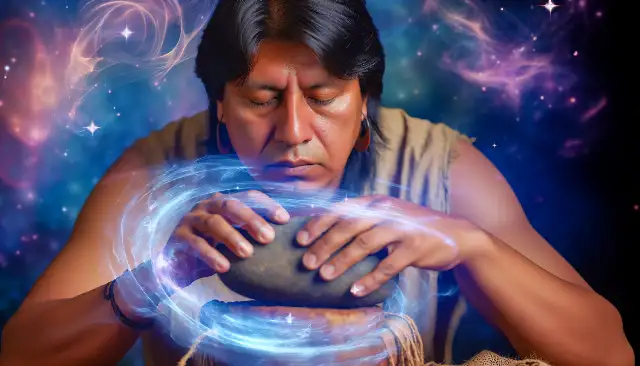
Will is the trigger, Intent is the gun
Everything is energy. You are living in a grand supermarket of energy, some is human, and most is not. There is an underlying fabric of the universe which is nothing but energy at its core.
Intent
The thing that moves that energy is intent. Change is the only real constant in the universe, but something motivates and creates the impetus for change. That thing is intent - it isn't conscious, it isn't some white guy with a beard on a throne, it is the guttural essence of life itself being molded, formed, born, destroyed, collected and reborn. Over and over again.
Intent is an energy. It is a very simple energy, in one sense, but its expression through personality and perception can be quite complicated. If we borrow a chorus from the Newtonian Physics Songbook, we know that energy can neither be created nor destroyed - it can only be changed in form. Spiritually, this opens up a really big can of worms. If intent is an energy and that energy is essentially forming human beings and is expressed as such, then it must remain as intent until something with greater energy acts upon it. Any intent, as energy formed and expressed as a commonality, must remain in existence through both time and space until acted upon by a greater force, which will either change the nature of the intent into something else, fortify the original intent, or simply move it in another or the same direction.
As an example, if you are doing the same form of recapitulation now, with the same intent that has been done before by many, many other human beings, there should exist a literal pool of intent that can be used to strengthen your own intent. And in this process, your own intent to recapitulate is added to the pool of energy that has been shaped over time. This energy then becomes a benefit both to you and to those that may follow you in doing the work. This is why I urge people not to mess around with the original form of the procedure. In doing so, they lose the benefit of accessing that level of human intent. The intent is the key, and as long as that is clear and concise in the work, they will be okay with it. They will make the progress they need towards their own healing.
Shamans use this pool of energy, the intent that already exists, in quite a bit of the work they do. In healing, for instance, take into consideration all the prayers, intents, desires and downright desperation there has been on the part of human beings through the eons to effect healing on other human beings. This can become a powerful ally to which to hitch your own intent when trying to help other people. The key, of course, is being able to perceive and understand it, then direct or rather, point it in the right direction. Even at that some people will refuse healing for their own energetic reasons, but at least you have a shot at helping in some way.
You can extrapolate from this the connections to other forms of human intent, including violence, anger, desire to protect, love, passion, etc. This is not about taking energy that isn't yours; it's about standing upon mountains that have already been built rather than trying to build a new mountain the next block over. But beyond all this lies universal intent, the intent of creation itself, which runs like an undertow beneath the currents of human awareness.
This all sounds very reasonable in some ways, but the problem is, it isn't something that we are commonly aware of as human beings. This is one of the reasons shamans tend to speak in terms designed to scare the bejeebers out of people who are seeking a casual acquaintance with the practices. They know, or have seen over time, that it is very easy to fall prey to any of these larger intents and thus become unbalanced and morbid. They seek to avoid that for people who are not equipped yet through experience to handle aspects of intent and energy that could easily overpower them. We are swimming in an ocean of intent. People often have the mistaken idea that intent is a purely human attribute. It is far from that.
Understand that almost all people have no clue how their intent manifests through them into the world. I've always referred to that as people's natural intents, the ones that they have no real conscious control over. These are affected most severely by other people in response to and out of a person's natural predilections, the ones they are born with. So, we are back to infancy, essentially. As they grow up, intent becomes more complicated because they add to those first impressions of intent their own desires which are both a product of those impressions and an individual expression of their goals in the world. People 'wish' for things, 'covet' things, desire certain outcomes for themselves, but almost all of those hearken back to intents that were formed on very basic levels in their past.
By the time people are around twelve years old, their intent is so scattered as to be largely ineffective for them. Enter the recapitulation. A shaman cleans their link to personal intent until they can once again wield it through their natural predilections. If they find their natural predilections to be objectionable, they alter them through intent itself towards desired outcomes. So, you might say the average person may apply will greatly to their intents, but it's usually happenstance if they succeed. Even a blind sow gets an acorn every now and then, in other words. The shaman, on the other hand, lays down a cluster bomb of intent and waits to see who sets off what. They direct their intent very effectively - sparingly, as it were. They understand how to build it in small step towards large goals, or wield it quickly to accomplish tasks in front of them in the moment. But, it's still very important for them to understand and be aware of the intents of others; someone may get off a lucky shot, after all. The object is to maneuver through the world with the least cost to their personal energy, and they do that most effectively if they aren't butting heads with the intents of others all the time. So, they 'see' them and work around them, or turn them to their advantage in accomplishing their own intents. This isn't to say they are manipulative of others intents - that would be counter productive and result in the attachment to the outcome of others. But, we don't live in a sterile environment as far as intent is concerned.
Using Intent is forming the unyielding intention of doing something. It has to be built up and energy applied to it. That applied energy is called Will.
Will
Will is a crucial element of personal energy for the simple reason that when we exercise intent, we naturally apply will to the effort. One cannot form and execute intents without will, but one can apply will without intent. If intent is the gun, then will is the trigger. Will, as a separate part of our personal energy, is crucial in the process of linking the larger rational mind with the more primitive and unknown energies of the hidden sides of our nature. If intent is the sword of reason, then will is the forge of the soul.
Intent and will are like this in relationship: if you intend to drive a nail, the hammer and your muscles are the vehicles of the intent, but how hard you hit the nail is a function of will. The decision to hit the nail is the intent, but the actual animation of the intent to strike it is the will. Without the will, nothing moves. It's a hard distinction to make. They seem the same, but they are not. As you work with intent, you will discover that there is a subtle but very powerful difference. Let's take an issue of self-improvement for instance. Say you had temper and anger issues that certain situations were sure to trigger. The intention to become more detached and handle these situations by not reacting the same way would be the intent. Applying it daily and reinforcing it would help make the intent strong, but when the situation arises that would normally trigger the anger issues, it is will which is applied to trigger the intent, allowing it to work as energy in the situation. In other words, "I intend not to let this make me angry", then the circumstances occur, and in that moment, you apply will to not become angry, thereby triggering the intent. The process of learning to control that is also one of learning to apply will to your own energy, which if you are lucky revolves around an intent.
Shamans learn to apply will directly to their intent, which is formed in very narrow and specific ways. While we can all remember instances of applying will specifically to certain intents we have had in life, we cannot for the most part explain how will is used in a rational sense. We tend to relegate will to that vague area of human emotions we aren't quite comfortable enough to explain, but know are necessary enough to keep close at hand. Will can be handled just like intent - it can be used to indemnify our actions through intent. We can feel 'will', we can feel the resolve it brings to accomplish what we have intended, but we don't stop to consider it as a separate function of our energy. Without will, however, we are stuck, unable to overcome the inertia of whatever life puts in our path. So what is will?
Will is the bending of our energy outside the normal venues of rational intent. When you have a goal, but no idea how to get there - not even the first step - you can feel for the welling up of energy in the solar plexus. That's will without attachment. Intents, or what you form as intentional outcomes, are a function of your reason, the rational mind. You will naturally apply the force of will to these because it is the simple nature of human beings to do no less. Hence, if one's intent is strong, focused and unyielding, results will follow. When we talk about will as a separate subject, we are off in a different though very similar direction. When a shaman wants to understand the unknown, or an aspect of the unknown, he or she has no way of knowing from a rational position where to begin that inquiry. But, by applying will alone to the movement towards that broad goal, things are bound to happen. That is, if the person wielding the will has the focus to do it. I was not taught so much about intent as I was about will and applying will at a level that only death would stop the progression towards a given goal. In that system, will is the crucial element for movement across boundaries that are, by even the most liberal standards, insane. Will is a force applied to create movement, and movement in this definition applies to anything that cannot be rationally attained through the application of pure intent. Intent is the application of will through the rational mind. Will alone, however, can be applied and used like a rapier.
Will and intent are two separate things. Each of us already operates on many levels of intent naturally. You breathe and your heart beats without you thinking about it; the intent to do so is natural. Will is like the fuse; intent is the bomb. You have to gather up your materials and make your bomb before the fuse is worth anything. Will is applied to intent - not the other way around. You can have the will to be successful, but if you don't create the intent on what and how to get there the will won't help. Wanting has nothing to do with it. It's what you intend to do that starts everything. Look at the different types of intent - there is natural intent, personal intent, conscious/unconscious intent, and the issue of competing intents.
Intent is a conscious form of will; it has shape, form, and substance. Will acts as a volitional trigger for the intent you have formed. In other words, you can think an intent, but it is will that shoves it out there. It's like when you recap an event that is tied to a pattern that runs outward in your life, but you don't move through the pattern but keep working on the same event, the other energy comes to you like sand falling through a hole in the bottom of a bucket. This brings back to you depression, anger, etc., those feelings have weight, they exist, and you can be swamped with them, sometimes. It's like the thought you haven't completed, or pushed out with will; you can become inundated by the old energy in patterns you weren't expecting. You're using unspoken intent to do the recapping, but when will is applied to the intent to take back your energy, it can bring back energy also trapped in those other patterns - like the thoughts that stayed in the room, you will feel them. Big patterns can be tough. You may see the energy you want back and grab it, but it turns out to be the stopper in the bottom of a bottle of related energy. It can be hard if you have a lot stored up there, but it will pass. You can think of will as an act - a real force in your energy.
Here is an example of using will. Imagine being in an attic in summer, trying to put a twelve-foot long, one-half-inch copper pipe through a five-eighths of an inch in diameter hole in the wall of a three-level house, and then through a second hole into the basement level. This is in the tiny space between wall studs in 130-degree heat. I plunked around for a half-hour or so with it, up and down three flights of stairs, prying with screwdrivers, no luck. Then I thought, "Wait a second; I know how to do this." I raised the pipe up out of the hole about five feet, willed it through the hole in the first floor and dropped it. A second later I heard it hit the floor in the basement (it has passed cleanly through the intended hole). Then, I picked up the second pipe, did the same thing and heard it hit the basement floor. That is the direct application of will. I just reached out from the midsection of my body with my will, took hold of the end of the pipe, 'saw' the hole at the bottom, dropped it, guided it through, then let go. It was directed without thought about achieving a result, but about only a part (hitting the hole), which then created the result. That was it. It was just done - no thought, no real visualization - only direct taking hold with will and going.
In my experience with that rock in the Intent story, I had been creating the intent as I moved back and forth, and suddenly, I reached a position where I couldn't hold the intent any longer and will set it off. They say the old shamans could send mountains flying into each other, but something may have been lost in translation. However, not to be able to lift that rock would have still taught me about intent, the rock's intent to stay put and the earth's intent to let it. Strong intent is mostly created by repetition in the beginning. It's okay to think it into being. Over time you learn to apply and handle intent without so much of the thought process getting involved.
Try to imagine nothingness - absolute nothingness. When you really can't, look at the feeling that keeps you from doing so. That is basic will, the will to survive. Will is at the base of what you are; it glues you together energetically. The difference between will and intent is subtle, but very real. You can direct it from your gut, feel it form there like a ball, and push the intent you've formed with it. Right around your navel, make it the center of your ball about 12 inches in diameter. This will help you keep will and intent separate.
How many times have you heard people say, "I'd like this or that, but it's not a big priority with me?" Well, they are spending energy on a myriad of intentions. Wouldn't it make sense to clear yourself out of all those little things and focus on the ones that really matter to you? You learn to clear yourself out in reality, by recapitulating and learning to apply will in a new way to your intent.
Think of will as physical action being applied according to a plan you have already laid down which is the intent. Shamans hollow themselves out so that when they focus their intent it is as powerful as possible. One must be careful about what they intend. Ultimately, intent can be gathered and you can use other people's intent, or the planet's itself to accomplish things. But you already function on a deep level with intent - it essentially keeps you alive. To understand the true nature of intent, and as they say, 'travel to the heart of it', you must come to know how it functions in you on that nonverbal level. People always want to start out focusing their intent on things outside themselves, like, "I want this," or, "I need that to happen," when the first thing they should be looking into is internal.
Detachment is very important, actually, crucial, because if your intent isn't applied in a detached way you become attached in the outcomes. That can sometimes be a real problem. The thing is, to use intent very much like a scalpel - you want to slice cleanly and powerfully, applying the intent, but like a surgeon, you aren't going to stand around with your hand on the wound in order to see if it heals. Your energy would become too diffuse, not knowing exactly where the application of it is aimed. You have to apply intent as though you are going to die, and at the same time, not care one way or the other about whether the outcome is specific to your intent. It is indeed a paradox. Energetically, once you start getting the hang of it, it makes perfect sense, except when you try to think about it. Remember, you are swimming in an ocean of intent.







You don`t have permission to comment here!
Terms & Conditions
Subscribe
Report
My comments